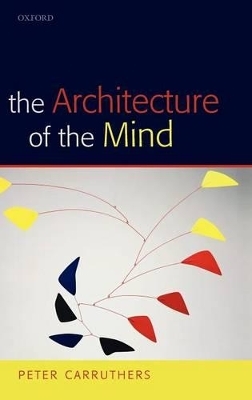
The Architecture of the Mind
Seiten
2006
Oxford University Press (Verlag)
978-0-19-920708-4 (ISBN)
Oxford University Press (Verlag)
978-0-19-920708-4 (ISBN)
Provides a comprehensive development and defense of one of the guiding assumptions of evolutionary psychology: that the human mind is composed of a large number of semi-independent modules. This book is a useful reading for those with an interest in the nature and organization of the mind.
This book is a comprehensive development and defense of one of the guiding assumptions of evolutionary psychology: that the human mind is composed of a large number of semi-independent modules. The Architecture of the Mind has three main goals. One is to argue for massive mental modularity. Another is to answer a 'How possibly?' challenge to any such approach. The first part of the book lays out the positive case supporting massive modularity. It also outlines how the thesis should best be developed, and articulates the notion of 'module' that is in question. Then the second part of the book takes up the challenge of explaining how the sorts of flexibility and creativity that are distinctive of the human mind could possibly be grounded in the operations of a massive number of modules.
Peter Carruthers's third aim is to show how the various components of the mind are likely to be linked and interact with one another - indeed, this is crucial to demonstrating how the human mind, together with its familiar capacities, can be underpinned by a massively modular set of mechanisms. He outlines and defends the basic framework of a perception / belief / desire / planning / motor-control architecture, as well as detailing the likely components and their modes of connectivity. Many specific claims about the place within this architecture of natural language, of a mind-reading system, and others are explained and motivated. A number of novel proposals are made in the course of these discussions, one of which is that creative human thought depends upon a prior kind of creativity of action.
Written with unusual clarity and directness, and surveying an extensive range of research in cognitive science, this book will be essential reading for anyone with an interest in the nature and organization of the mind.
This book is a comprehensive development and defense of one of the guiding assumptions of evolutionary psychology: that the human mind is composed of a large number of semi-independent modules. The Architecture of the Mind has three main goals. One is to argue for massive mental modularity. Another is to answer a 'How possibly?' challenge to any such approach. The first part of the book lays out the positive case supporting massive modularity. It also outlines how the thesis should best be developed, and articulates the notion of 'module' that is in question. Then the second part of the book takes up the challenge of explaining how the sorts of flexibility and creativity that are distinctive of the human mind could possibly be grounded in the operations of a massive number of modules.
Peter Carruthers's third aim is to show how the various components of the mind are likely to be linked and interact with one another - indeed, this is crucial to demonstrating how the human mind, together with its familiar capacities, can be underpinned by a massively modular set of mechanisms. He outlines and defends the basic framework of a perception / belief / desire / planning / motor-control architecture, as well as detailing the likely components and their modes of connectivity. Many specific claims about the place within this architecture of natural language, of a mind-reading system, and others are explained and motivated. A number of novel proposals are made in the course of these discussions, one of which is that creative human thought depends upon a prior kind of creativity of action.
Written with unusual clarity and directness, and surveying an extensive range of research in cognitive science, this book will be essential reading for anyone with an interest in the nature and organization of the mind.
1. The Case for Massively Modular Models of Mind ; 2. The Architecture of Animal Minds ; 3. Modules of the Human Mind ; 4. Modularity and Flexibility: the First Steps ; 5. Creative Cognition in a Modular Mind ; 6. The Cognitive Basis of Science ; 7. Distinctively Human Practical Reason ; 8. Conclusion to the Volume
| Erscheint lt. Verlag | 12.10.2006 |
|---|---|
| Zusatzinfo | 23 figures |
| Verlagsort | Oxford |
| Sprache | englisch |
| Maße | 165 x 240 mm |
| Gewicht | 848 g |
| Themenwelt | Geisteswissenschaften ► Philosophie |
| Geisteswissenschaften ► Psychologie ► Allgemeine Psychologie | |
| Geisteswissenschaften ► Psychologie ► Verhaltenstherapie | |
| ISBN-10 | 0-19-920708-9 / 0199207089 |
| ISBN-13 | 978-0-19-920708-4 / 9780199207084 |
| Zustand | Neuware |
| Informationen gemäß Produktsicherheitsverordnung (GPSR) | |
| Haben Sie eine Frage zum Produkt? |
Mehr entdecken
aus dem Bereich
aus dem Bereich
Techniken der Verhaltenstherapie
Buch (2024)
Julius Beltz GmbH & Co. KG (Verlag)
35,00 €


